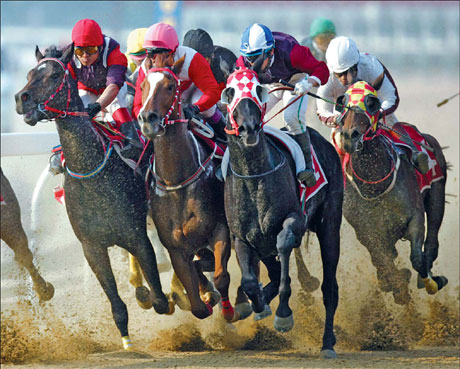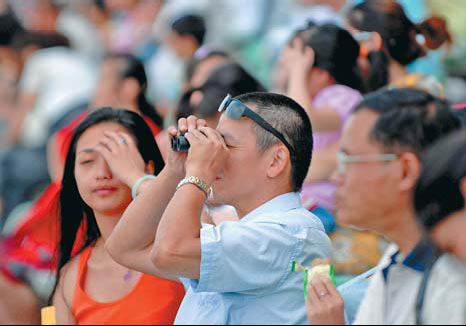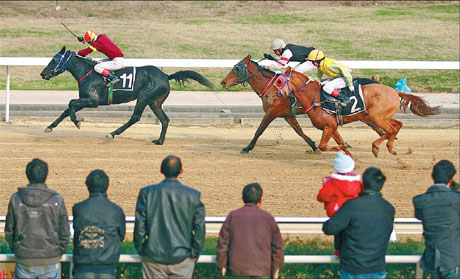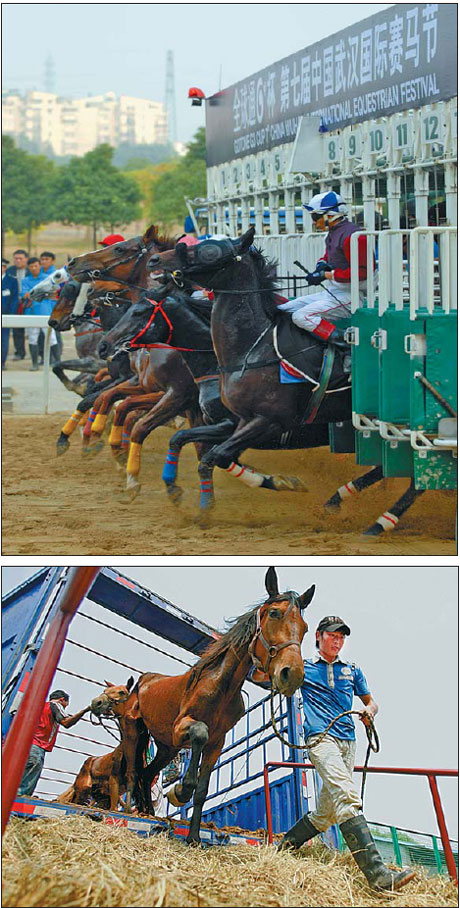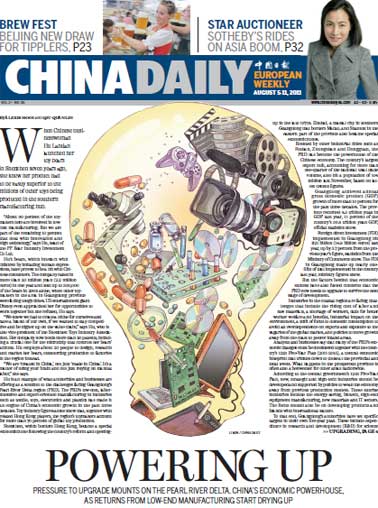Society
When will the horses run?
Updated: 2011-08-07 07:40
By Duan Yan (China Daily)
|
In Wuhan, the horses are off and running, but the punters are left holding tickets that earn them shopping vouchers in raffles held in-between races. Provided to China Daily |
|
Big punters peering hopefully into the future of horse racing in China are taking huge chances by investing in racetracks in many major cities. Provided to China Daily |
|
The horses are running in the Chinese mainland, but with the betting element removed from this traditional game, race-goers are left slightly bewildered at the tracks. Photos provided to China Daily |
Although horse racing in Hong Kong and Macao has enjoyed a long and illustrious history, the Chinese mainland has been slow to introduce betting on the racetracks. We look at some of the issues at stake, with Duan Yan reporting from Wuhan in Hubei province.
It is a very different scenario from the traditional racetrack. When the horses gallop on the dirt track at Wuhan's Orient Lucky City, Hu Wenkang is fidgeting in the front row of the stands, his eyes glued to the big digital display. Instead of cheering for the winning jockey, the retired history teacher is waiting impatiently for the raffle draw in-between races. That's his only chance of winning something. Betting on the horses is not allowed, so Hu has no stake in the race, just like the other race-goers on the stands, a few hundred spread out in a stadium that can hold 30,000. Last year, the organizers had given out a "small prize for guessing the winning horse", but that's no longer allowed.
With that ruling, track owners in Wuhan and elsewhere - who had collectively bet millions that wagering on horse races was coming to the Chinese mainland by heavily investing in the tracks - are left holding tickets they may not be able to cash.
Betting is illegal in China and the central government is quick to pounce on anything that resembles organized gambling.
"The media had misinterpreted our meaning. The small prize for guessing the winner is nothing like the betting of Hong Kong's horse racing," Liu Hongqing, spokesman for Wuhan's Orient Lucky City racecourse, defended the "small prize".
The Wuhan races are organized by the Hubei provincial government and run by Orient Lucky Horse Industry (Wuhan) Co Ltd, an enterprise based in Hong Kong.
Liu repeatedly stressed the difference between Hong Kong-style horse betting and the "guessing game" that involved only fixed-price tickets. In Hong Kong and Macao, punters are allowed to bet any amount on tickets that will increase their chances of winning based on a traditional system that calculates the odds.
The fact that Wuhan was allowed to run the races had fueled speculations that China may lift the ban on horse betting in the mainland. Rumors of that have circulated in recent years, and there have been investors who have taken a stake in the odds - by building racetracks.
It is not only Wuhan which is hopeful and willing to push the OB markers. Cities like Beijing and Guangzhou, too, have had a history of testing the waters, and failing.
Nonetheless, the enthusiasm has not been dampened. Across China, cities like Chengdu, Nanjing, Chongqing, Jinan as well as Hainan province are all building racetracks and sitting on the fences waiting for the day when the central government finally relaxes the ban.
But, the signals are still mixed.
The General Administration of Sports, which gave the go-ahead for the Wuhan races, put the lid on speculation by making an announcement on June 10 that stated it never approved of any form of "prize winning guessing" activities in Olympic equestrian and traditional speed racing events.
For Orient Lucky's Liu, the announcement was a "heavy blow" not only to the event itself, but also to China's horse racing prospects because the key element was now out of the picture.
Besides the hopeful track owners, how does the Administration's announcement affect layman punters like Hu Wenkang? He was also at the track last September when there was still the guessing game.
"There was a horse race and I bet on the No 2 horse. I won a shopping voucher worth 100 yuan." Hu wished he had bought more tickets then. "There were people who were much smarter than I was, and bought many tickets so they could bet on more numbers and win more prizes."
This year, Hu is collecting entrance tickets with raffle numbers, and waits for the chance to win vouchers in-between races.
"It's a very profitable business for the racetrack owners and rich people, but I don't think the industry will benefit locals that much," Hu says. "A small amount of gambling is not so bad after all, and should be allowed when people's living standards have improved."
Yang Fangpeng of Wuhan, a 33-year old engineer, was also at the races with his friends. They were there only because admission was free and there would be raffles between races, he said. And he's totally against betting.
"Horse racing should remain a weekend entertainment, but not for gambling," he says. "Besides, many people in Wuhan are already big fans of gambling. They play mahjong and poker."
Yang says he hears enough stories in the villages about migrant workers who come home during Spring Festival and lose their entire wages playing poker with friends and strangers.
From 2001 to 2008, the central government had cracked down on extensive illegal betting on Hong Kong's Mark Six lottery and horse races prevalent in neighboring Guangdong, and which then spread like wild fire to Central China's Hubei and Hunan provinces.
But there are other attractive facets to the racetrack that are recognized and already well established among the rich and famous in countries where horseracing is a recognized and elite event on the social calendar.
It was these impressions that attracted Xu Jin, 33, a public relations manager. He was considering becoming a horse owner by paying the 380,000 yuan ($58,976) membership fee to the racetrack. For him, there is the element of prestige, and the advantage of networking with other business leaders. Of course, the prize money, an incentive for owners whose horses win the race, is also an attraction.
"It's like joining the golf club. It's a status symbol and a business investment," he says. But now, it all depends on whether the racetracks can adopt the traditional international standards.
"If betting is not allowed, the races won't be held regularly and I don't think there would be many who would be willing to buy a horse just for the fun of it."
Xu thinks that if horse racing loses its gambling element, it's going to be difficult to start and keep the passion for racing alive.
Local government and scholars are keen to have the horses running to push the local economy forward with the prospect of more tourists coming to the tracks. In addition, they argue that legalizing gambling may be one solution to prevalent illegal gambling underground.
According to statistics from the China Center for Lottery Studies at Peking University, China loses about 600 billion yuan each year to other countries through illegal betting, especially with the popularity of online gambling sites.
"Our research shows that China is completely capable of legalizing race-track betting," said Qin Zunwen, director of the Horse Racing Betting Research Institute in Wuhan and vice-president of Hubei Academy of Social Science, according to an interview he gave the Shanghai-based publication Dongfang Daily in 2008.
Qin told the publication that legalizing horse racing could create at least 5.6 million jobs for China, help increase government revenue and boost public welfare by paying 15 percent of its revenue as tax.
It can also develop another rural industry - horse breeding. According to Qin, the number of horses in China had decreased in recent years, dropping from 11.4 million to 7 million. Currently, horses are used mainly for tourism, the film industry and equestrian sports.
In comparison, the United States with its thriving horse breeding industry, currently boasts about 8 million steeds.
"One American thoroughbred could sell for hundreds of thousands of dollars or even millions, while in China, a horse could be as cheap as 1,200 yuan ($185). If the Chinese farmer can sell one thoroughbred, he does not need to worry about money for the rest of his life," Qin had told Dongfang Daily.
But when China Daily contacted him this time, Qin declined our request for an interview.
"I've not been following the recent developments," he said. "At present, it's best to talk to the local sports administrations about the event. They can offer official responses to your questions."
Wu Gangfang, commissioner of public promotion for the Chinese Equestrian Association, is more forthright.
Wu thinks China is not ready for horse betting because it does not have the legal framework for it, and it lacks a system to ensure the transparency of the betting operations or tests to prevent drug use or other forms of cheating.
"People cheat even at table tennis, which is played right in front of you. How can we prevent cheating in horse racing where there is an animal involved?"
Wu believed that even if there is going to be a race lottery eventually, the onus is on the local governments to hold such sweepstakes and for the central government to impose the regulations.
As for developing a breeding industry, Wu pointed out that the opening up of legalized horse races would only bring in more imported race horses, which can run much faster than Chinese-bred horses, but cannot breed because they are mostly gelded.
Qin Zunwen's Horse Racing Betting Research Institute in Wuhan was founded in 2008, and its establishment was regarded as another sign that the country was preparing to legalize horse betting. But again, the tide seems to have changed.
Local government agencies and other advocates who had been lobbying for the cause are now reluctant to answer questions.
The Hubei Administration of Sport and Wuhan Sports Bureau did not respond to our questions. Another advocate of legalized horse racing, Qin Yingwei, the secretary-general of Wuhan Committee of Chinese Democratic League, the first person in Wuhan to put forward the idea, has also declined to be interviewed.
The future of horse-racing as a gambling sport in China is still uncertain.
Although cities like Beijing and Guangzhou have flirted with the idea, they all failed to turn the dirt tracks into yellow-brick roads after the central government pulled in the reins.
Sometimes, the punishment can be harsh for punters determined to run the course. In 2000, Huang Qihuan, chief executive of the Guangzhou racetrack, was sentenced to 19 years in prison on corruption and embezzlement charges.
In Beijing, the expensive Tongshun Jockey Club, which had cost over 300 million yuan to build, opened in 2001, but was left out in the cold after the Beijing Municipal Public Security Bureau shut down its betting activities in 2005.
The owners destroyed hundreds of thoroughbreds imported from Australia after racing was discontinued, according to the Beijing Times.
But in spite of all these false starts, the huge potential profit motive still keeps hopes alive. Investors are still waiting for the races to start, but as Wu Gangfang warns, China will still have to get the formula right.
You can contact the writer at duanyan@chinadaily.com.cn.
|
Scholars and experts are still arguing the pros and cons of allowing betting on the racetracks. While some say it will stimulate urban economies and encourage rural horse farms, others say the mainland is not ready, and the social cost may be too high a price to pay. Photos provided to China Daily |
(China Daily 08/07/2011 page1)
E-paper
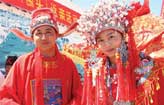
My Chinese Valentine
Local businesses are cashing in on a traditional love story involving a cow herder and a goddess
Outdoor success
Lifting the veil
Allure of mystery
Specials
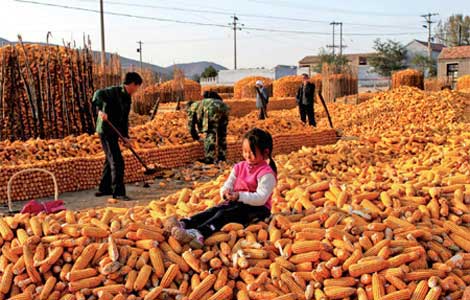
Sowing the seeds of doubt
The presence in China of multinationals such as Monsanto and Pioneer is sparking controversy

Lifting the veil
Beijing's Palace Museum, also known as the Forbidden City, is steeped in history, dreams and tears, which are perfectly reflected in design.

Beer we go
Early numbers not so robust for Beijing's first international beer festival
